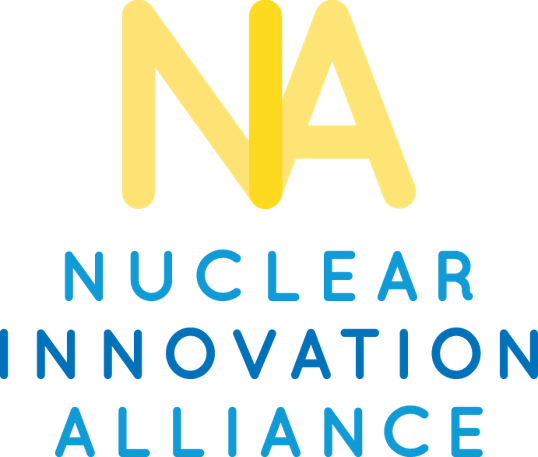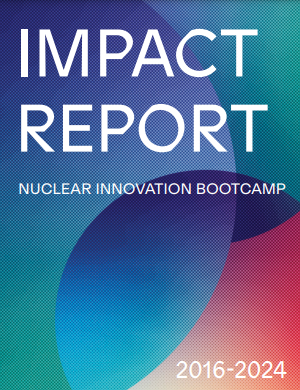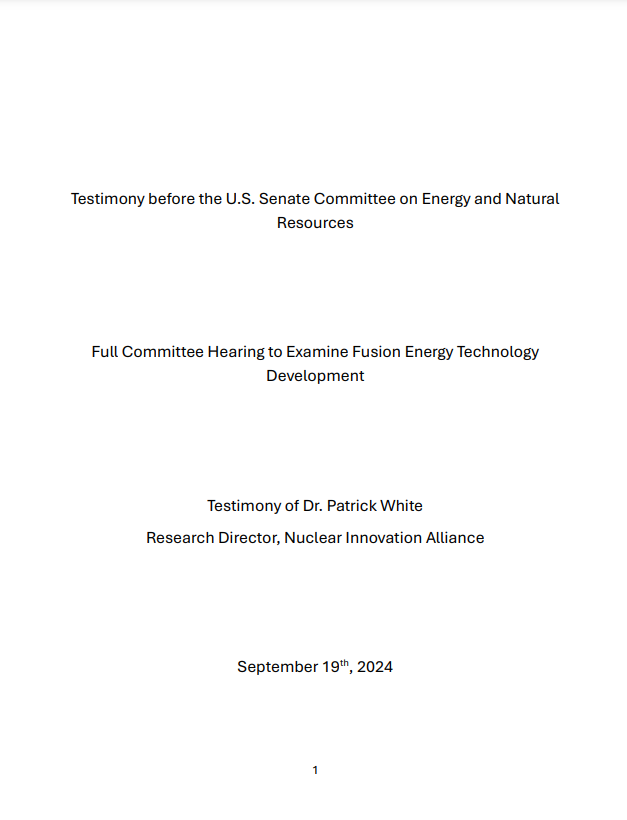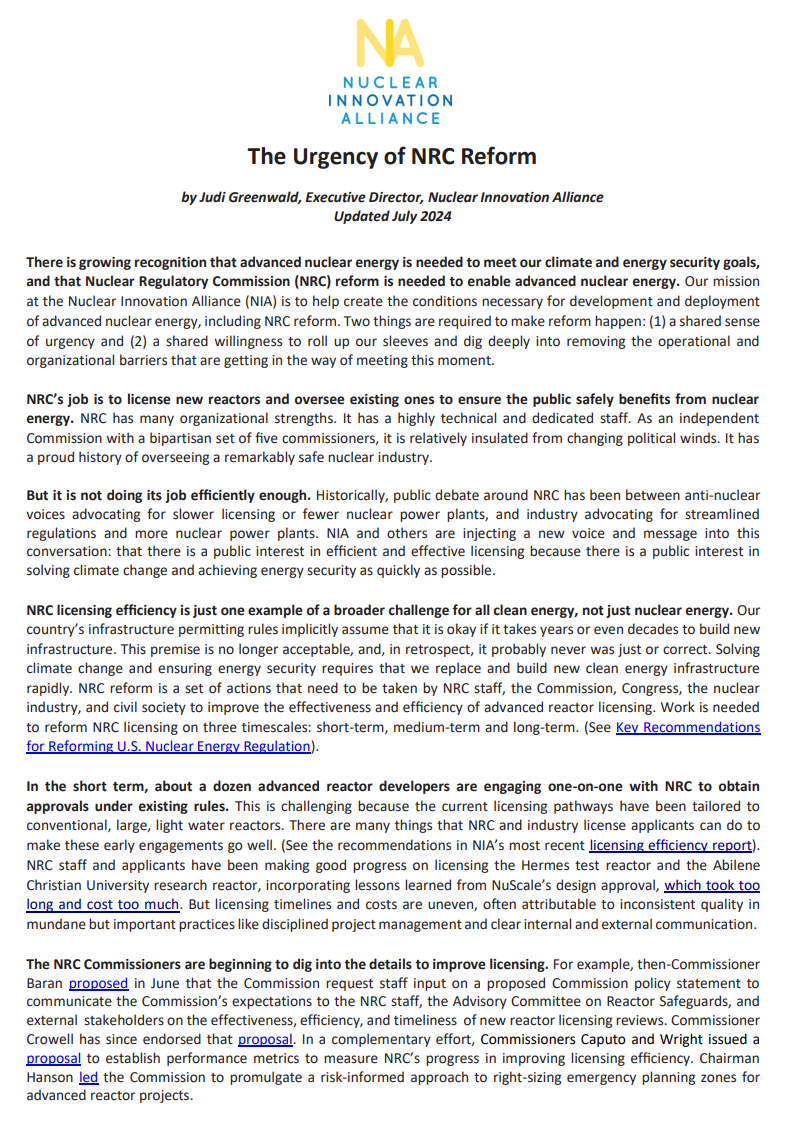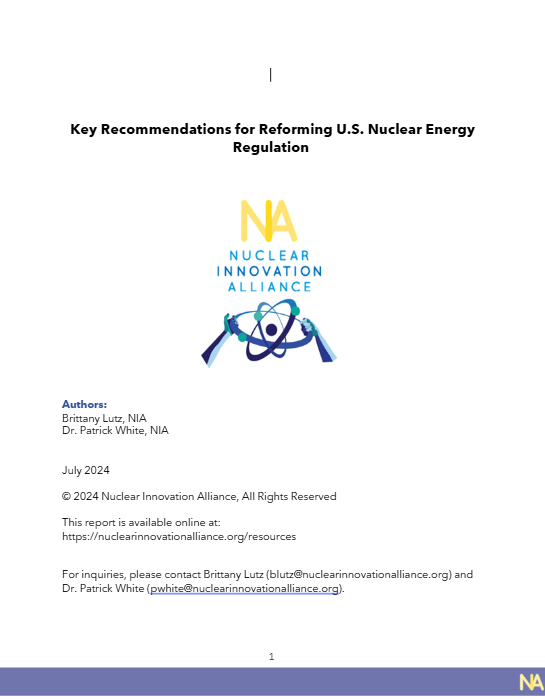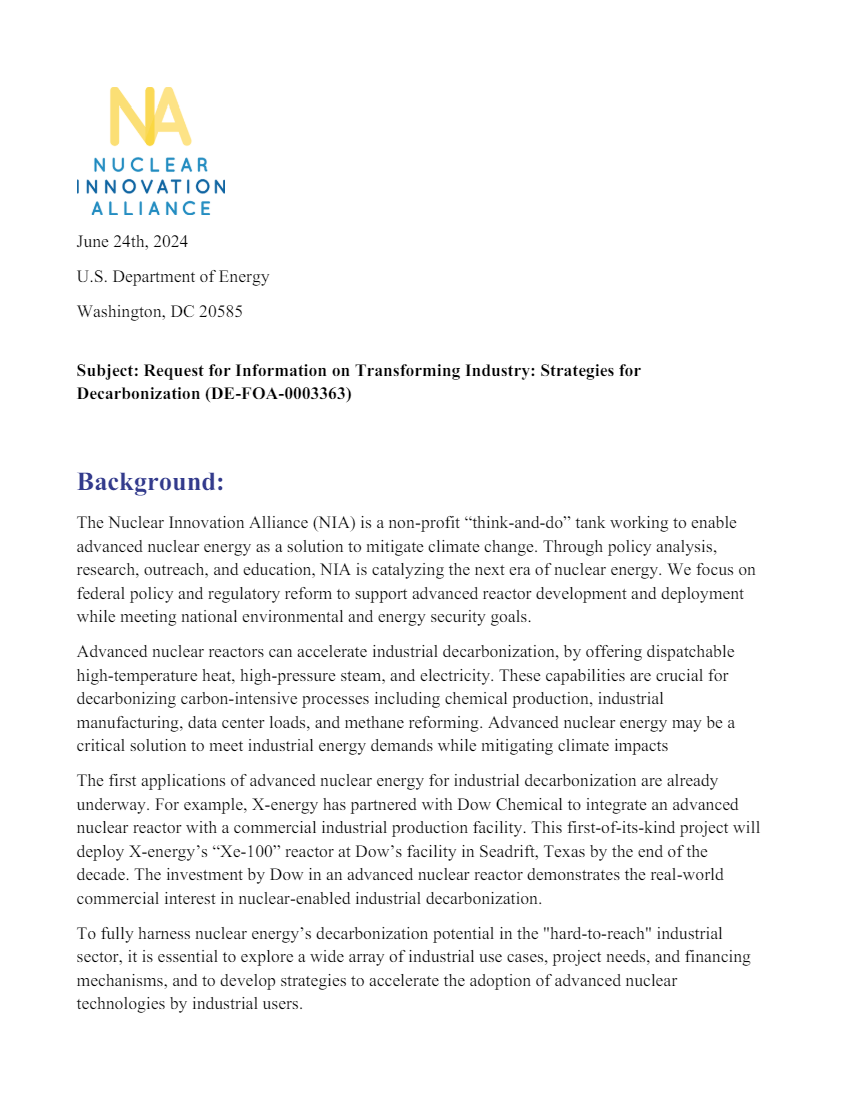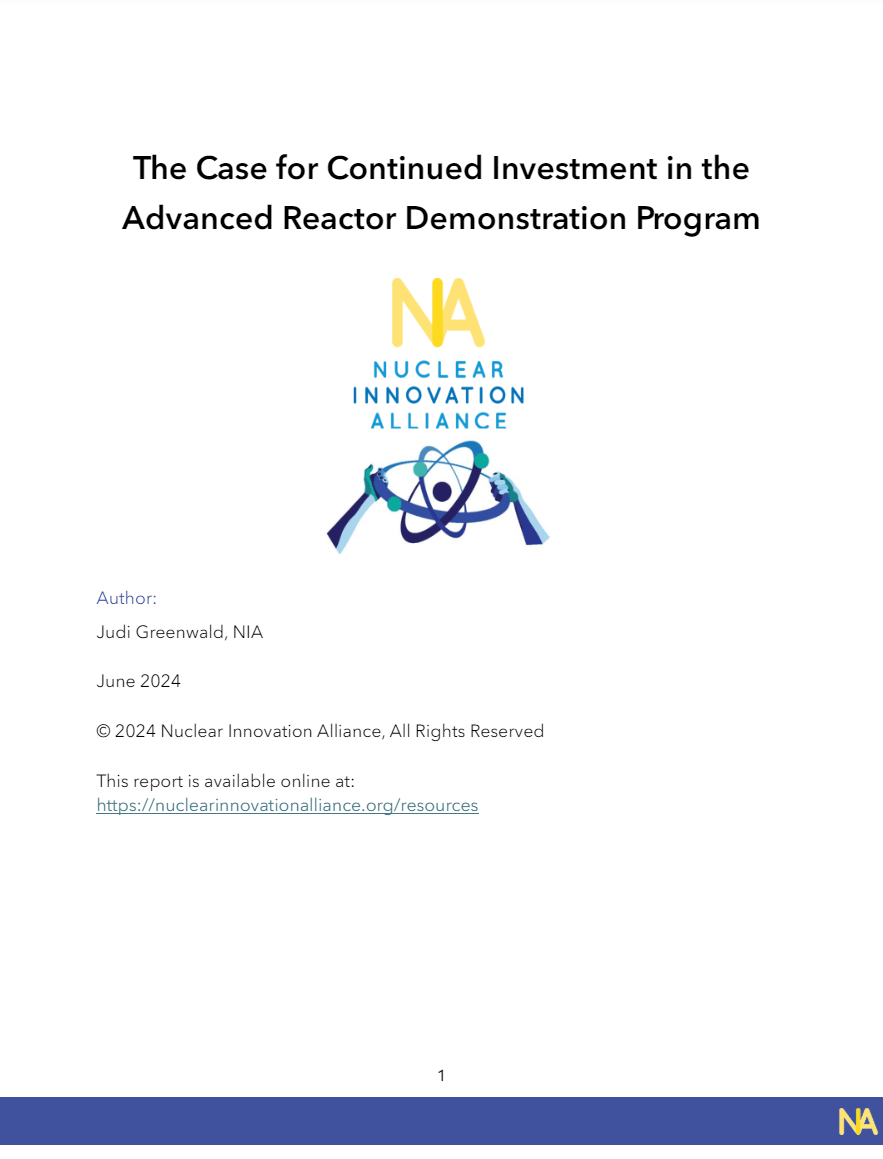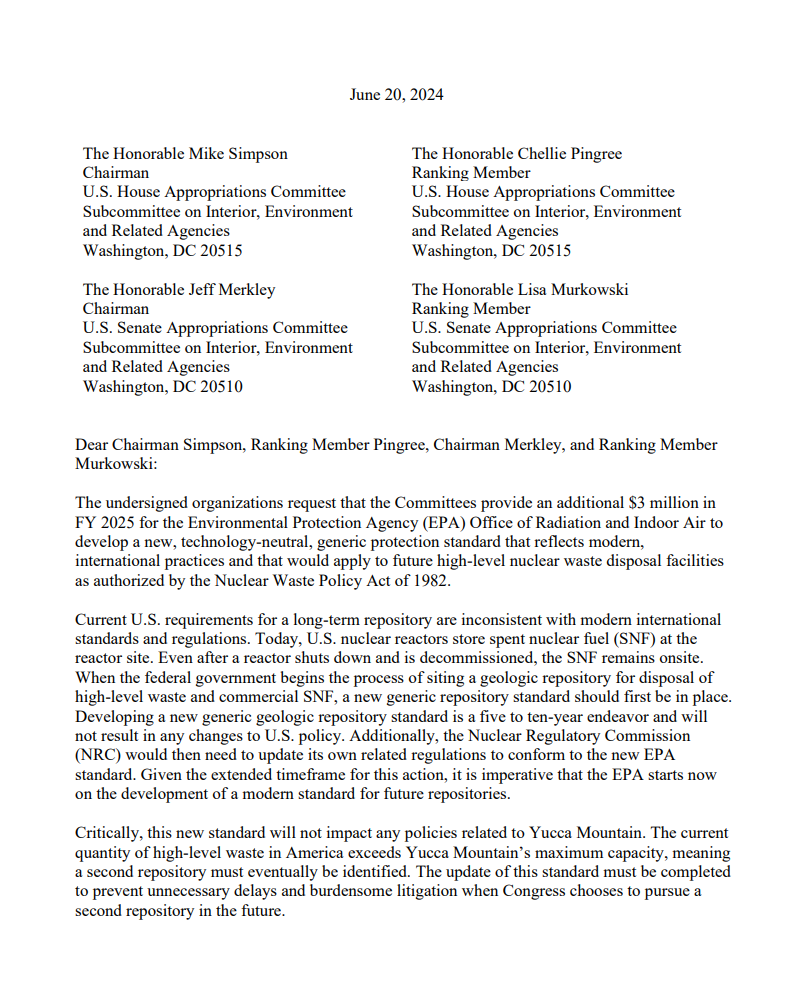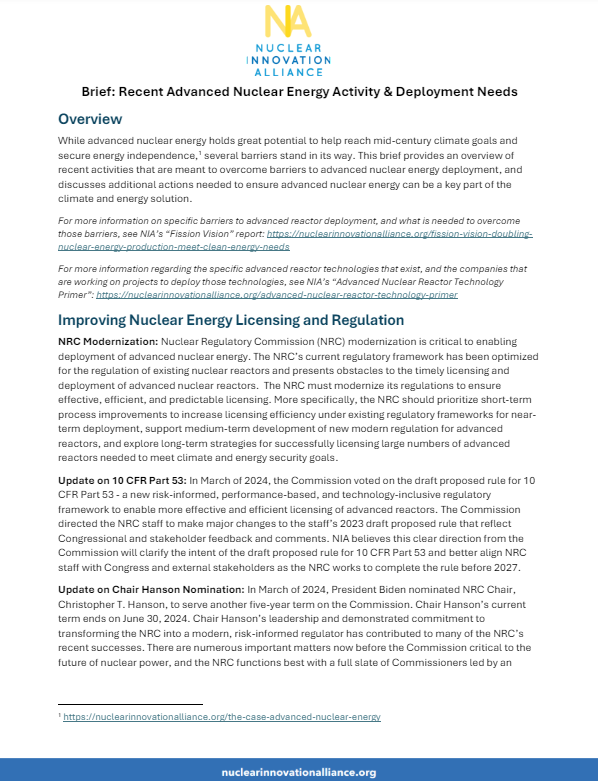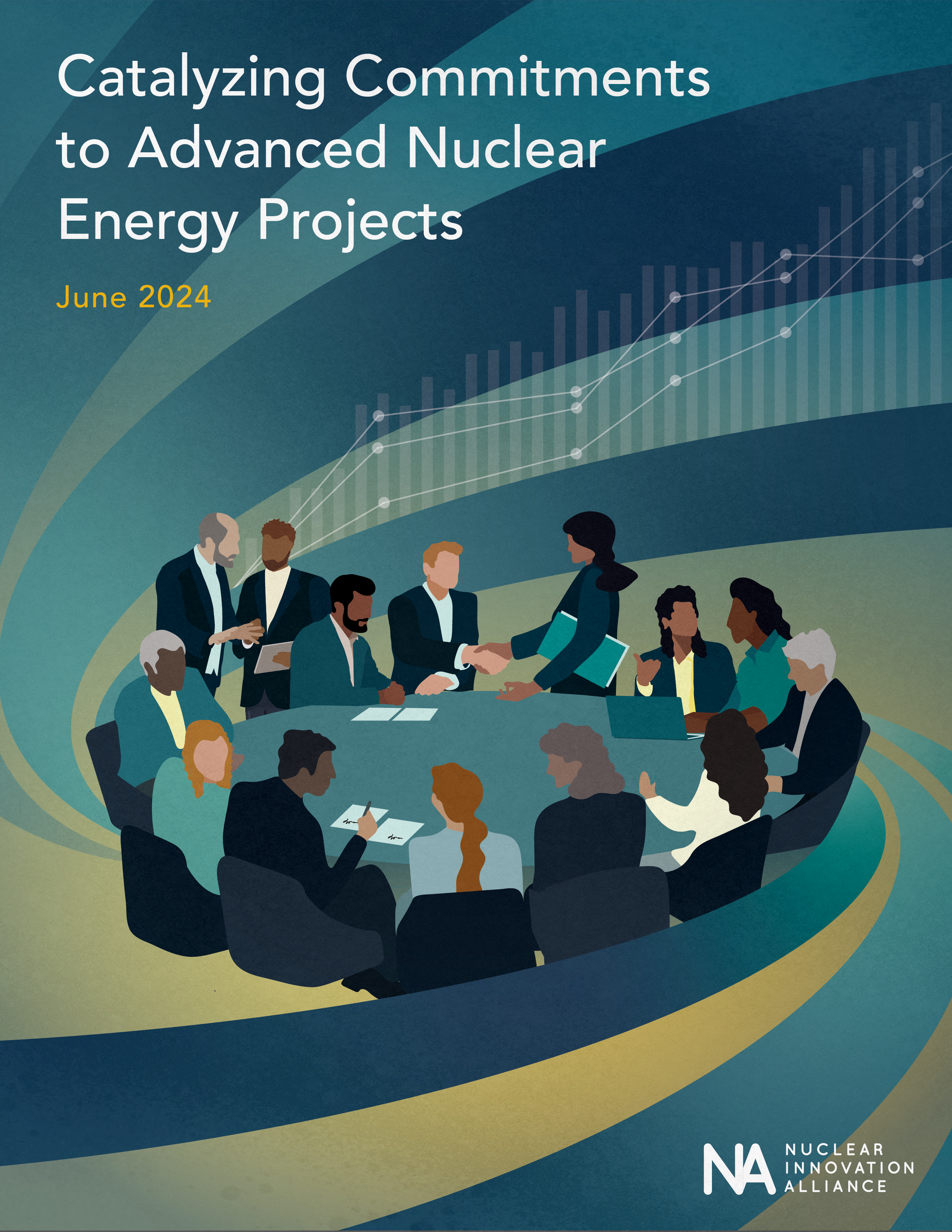The Nuclear Innovation Alliance hosted a publication release webinar for our newest publication "New Nuclear Project Development," by Stephen Greene. This webinar featured report author and NIA senior fellow Stephen Greene, Jeffrey Miller of TerraPower, Craig Bealmear of Oklo and moderator Judi Greenwald of NIA.
This report provides a primer on project development including what roles need to be filled, the stages of project development, and what capabilities are needed to be a project developer. The report is intended to serve as a resource for stakeholders including regulators, congressional staff, media, developers, advocates and others interested in the role of nuclear power in meeting our climate and energy commitments.
To read the report click here.
Nuclear Innovation Bootcamp Impact Report
Washington D.C. Since 2016, The Nuclear Innovation Bootcamp (NIB) has enhanced the careers of students and young professionals working or looking to work in the advanced nuclear energy sector. As the demand for experienced leadership, new ideas, and professional development in this field continues to grow, NIB will be an increasingly important recruitment pipeline for diverse, creative, and energetic young talent.
Looking forward, NIB is preparing to embark on the next phase of its development by focusing on three core initiatives:
- Strengthening its commitments to innovation education and increasing diversity in the nuclear energy sector
- Expanding its engagement with a broader range of communities and industries
- Recruiting talent from underrepresented disciplines and professions
Before embarking on these changes, NIB started by learning from those at the center of our program:
the 175 participants of our first six Bootcamps who now make up our alumni network. The information in
this report is largely based on survey results and interviews from this group. We hope that you will find
the information and stories below as motivating as we do.
On September 19th, 2024, Dr. Patrick White testified before the U.S. Senate Committee on Energy and Natural Resources during a full committee hearing to examine fusion energy technology development. To view Dr. White's written testimony and opening remarks, click the 'download' button below. To view a recording of the full hearing, click the following link: https://www.energy.senate.gov/hearings/2024/9/full-committee-hearing-to
The Urgency of NRC Reform
This brief authored by NIA Executive Director Judi Greenwald connects the role of advanced nuclear energy in meeting climate and energy security goals with the urgent need for NRC reform to enable advanced nuclear energy. It outlines the short-, medium- and long-term NRC reforms that are necessary to achieve that goal. It provides recommendations for action by Congress and the NRC and highlights several of NIA's recommendations for improving licensing efficiency. NIA developed this brief to serve as a guide for policymakers, the NRC itself, and key stakeholders in considering and then taking action to ensure the NRC can "become an agile, modern, risk-informed, and performance-based regulator to successfully meet this moment."
Key Recommendations for Reforming U.S. Nuclear Energy Regulation
This paper compiles a set of specific NIA recommendations for NRC reforms that would facilitate the licensing and deployment of advanced nuclear energy at scale. It also describes the specific roles of different players (Congress, the NRC Commission, NRC management and staff, and advanced reactor license applicants) in creating a modernized, effective regulator.
Two important developments make this update particularly timely. First, Congress recently enacted the ADVANCE Act, providing NRC with additional authorities and reporting requirements that the agency must effectively implement and complete. Second, the NRC just announced a new Executive Director for Operations and is in the process of filling several vacancies in key leadership positions. The incoming leadership has the opportunity to inspire, empower, and hold accountable the NRC staff for new levels of high performance.
To view NIA's press statement regarding the publication of this paper, click here.
NIA's response to the DOE Office of Energy Efficiency and Renewable Energy's (EERE's) Industrial Efficiency and Decarbonization Office (IEDO) request for information regarding strategies for industrial decarbonization. (DE-FOA-0003363).
This brief presents the case for continued investment in the U.S. Department of Energy's Advanced Reactor Demonstration Program (ARDP) to ensure the successful deployment of advanced nuclear energy technologies. It discusses the many benefits that a successful ARDP brings with it and why continued investment should be prioritized. More specifically, the following topics and benefits are discussed:
- Providing new commercial use cases for advanced nuclear energy
- Creating benefits for other advanced nuclear energy projects
- Accelerating U.S. NRC licensing of advanced nuclear reactors
- Attracting private capital
- Creating high quality jobs both locally and nationally.
This letter, signed by NIA and other organizations, requests that the US. House Appropriations Committee provide an additional $3 million in FY 2025 for the EPA's Office of Radiation and Indoor Air to develop a new, technology-neutral, generic protection standard that reflects modern, international practices and that would apply to future high-level nuclear waste disposal facilities as authorized by the Nuclear Waste Policy Act of 1982.
Recent Advanced Nuclear Energy Activity & Deployment Needs
This brief provides an overview of recent events that have taken place in the advanced reactor ecosystem, as of June 2024, with a focus on advanced reactor opportunities, deployment needs, and progress that has been made with respect to the following topics: licensing and regulation, federal legislation and fuel availability, industrial decarbonization, exports, early mover project risk sharing, and hydrogen production.
Catalyzing Commitments to Advanced Nuclear Energy Projects
This report summarizes insights from a series of workshops conducted by The Nuclear Innovation Alliance (NIA) under Chatham House rules in 2023 and early 2024 to identify the factors inhibiting commitments to advanced nuclear energy projects and potential steps to accelerate such commitments. Through these workshops, we found that key factors holding back further commitments include the uncertainty in the ultimate project cost and the long and expensive development process for nuclear energy projects, including licensing. We identified potential actions by private-sector actors, the U.S. Department of Energy (DOE), and Congress to accelerate commitments to additional advanced nuclear energy projects by reducing and sharing risks facing early mover projects.
To view NIA's press statement regarding the publication of this paper, click here.
